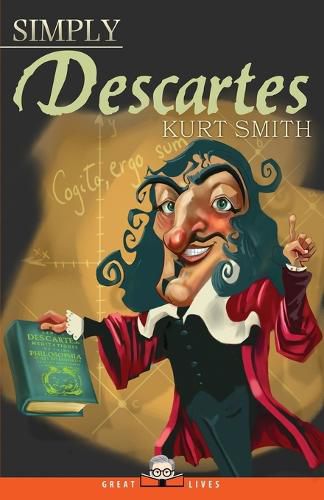Readings Newsletter
Become a Readings Member to make your shopping experience even easier.
Sign in or sign up for free!
You’re not far away from qualifying for FREE standard shipping within Australia
You’ve qualified for FREE standard shipping within Australia
The cart is loading…






This title is printed to order. This book may have been self-published. If so, we cannot guarantee the quality of the content. In the main most books will have gone through the editing process however some may not. We therefore suggest that you be aware of this before ordering this book. If in doubt check either the author or publisher’s details as we are unable to accept any returns unless they are faulty. Please contact us if you have any questions.
Rene Descartes was born in La Haye en Touraine, France, on March 31, 1596. He attended a Jesuit college and studied law for two years, but he soon gave up formal academics to immerse himself in the great book of the world. In 1618, he joined the army, where he became interested in military engineering and expanded his knowledge of physics and mathematics. Then, one night in 1619, he experienced what he described as divine visions, which inspired him to create a new mathematics-based philosophy. He spent the next 30 years writing a series of works that radically transformed mathematics and philosophy and, by the time of his death in 1650, he was recognized as one of Europe’s greatest philosophers and scientists.In Simply Descartes, Professor Kurt Smith offers the general reader an opportunity to get better acquainted with the philosophy of the man who, as much as any individual, helped shape our contemporary way of thinking. Written in simple, nonacademic language and based on the best recent scholarship, Simply Descartes is the ideal introduction to Descartes’ life and work-from the famous Cogito ( I think, therefore I am ) to the development of analytic geometry, to the nature of God.Not to mention which, if you’ve ever wondered whether all living things are nothing more than fancy machines, or whether life is really a Matrix-like dream, you’ll be amazed to discover that a 17th-century philosopher was asking (and answering) the same things!
$9.00 standard shipping within Australia
FREE standard shipping within Australia for orders over $100.00
Express & International shipping calculated at checkout
This title is printed to order. This book may have been self-published. If so, we cannot guarantee the quality of the content. In the main most books will have gone through the editing process however some may not. We therefore suggest that you be aware of this before ordering this book. If in doubt check either the author or publisher’s details as we are unable to accept any returns unless they are faulty. Please contact us if you have any questions.
Rene Descartes was born in La Haye en Touraine, France, on March 31, 1596. He attended a Jesuit college and studied law for two years, but he soon gave up formal academics to immerse himself in the great book of the world. In 1618, he joined the army, where he became interested in military engineering and expanded his knowledge of physics and mathematics. Then, one night in 1619, he experienced what he described as divine visions, which inspired him to create a new mathematics-based philosophy. He spent the next 30 years writing a series of works that radically transformed mathematics and philosophy and, by the time of his death in 1650, he was recognized as one of Europe’s greatest philosophers and scientists.In Simply Descartes, Professor Kurt Smith offers the general reader an opportunity to get better acquainted with the philosophy of the man who, as much as any individual, helped shape our contemporary way of thinking. Written in simple, nonacademic language and based on the best recent scholarship, Simply Descartes is the ideal introduction to Descartes’ life and work-from the famous Cogito ( I think, therefore I am ) to the development of analytic geometry, to the nature of God.Not to mention which, if you’ve ever wondered whether all living things are nothing more than fancy machines, or whether life is really a Matrix-like dream, you’ll be amazed to discover that a 17th-century philosopher was asking (and answering) the same things!